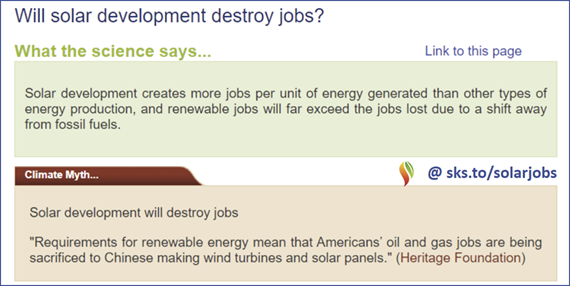Sabin 33 #8 - Will solar development destroy jobs?
Posted on 24 December 2024 by BaerbelW
On November 1, 2024 we announced the publication of 33 rebuttals based on the report "Rebutting 33 False Claims About Solar, Wind, and Electric Vehicles" written by Matthew Eisenson, Jacob Elkin, Andy Fitch, Matthew Ard, Kaya Sittinger & Samuel Lavine and published by the Sabin Center for Climate Change Law at Columbia Law School in 2024. Below is the blog post version of rebuttal #8 based on Sabin's report.
Solar development creates significantly more jobs per unit of energy generated than other types of energy production, including natural gas1. Moreover, the number of jobs created by the renewable energy industry, including solar, is expected to far exceed the number lost due to a shift away from fossil fuels. The United States’ Fifth National Climate Assessment predicts that there will be nearly 3,000,000 new solar, wind, and transmission-related jobs by 2050 in a high electrification scenario and 6,000,000 new jobs in a 100% renewable scenario, with less than 1,000,000 fossil fuel-related jobs lost2.
Figure 1: Energy employment from 2020 to 2050 under various U.S. net-zero GHG emissions scenarios. Source: U.S. Global Change Research Program.
As of 2022, the solar industry supported approximately 346,143 U.S. jobs, including 175,302 construction jobs and 44,875 manufacturing jobs, with numbers generally increasing each year3. In addition, most of these jobs cannot be outsourced. Roughly 65% of today’s U.S. solar energy jobs are in project development and 6% are in operations or maintenance, most of which cannot be exported4. The number of jobs in solar energy also exceeds those in the fossil fuel generation industries. In Kentucky, for example, there are now eight times as many jobs in clean energy, including solar, as coal mining5. Throughout the United States, there are roughly 5.4 times as many jobs in solar alone than in coal, and there are roughly 1.78 times as many jobs in solar than in coal, gas, and oil generation combined.
Domestic job growth in solar production and related industries has been further accelerated by recent federal legislation, including the 2021 Infrastructure Investment and Jobs Act, and the 2022 Inflation Reduction Act, which collectively provide more than $60 billion to support clean energy manufacturing, primarily with domestic supply chains6. In response, manufacturers have announced plans to build multibillion dollar solar panel manufacturing facilities and related battery manufacturing facilities in the United States that will employ thousands of workers7. At a smaller scale, the emerging solar recycling industry has also begun to create jobs8.
Footnotes:
[1] National Association of State Energy Officials et al., Wages, Benefits and Change (last visited March 25, 2024).
[2] U.S. Global Change Research Program, Fifth National Climate Assessment at 32-29 (2023)
[3] United States Energy & Employment Report 2023, U.S. Dep’t of Energy (June 2023).
[4] National Solar Jobs Census 2022, Interstate Renewable Energy Council (last visited March 25, 2024).
[5] Ryan Van Velzer, Kentucky has the second fastest growing clean energy sector in the U.S., Louisville Public Media, Sept. 27, 2023
[6] DOE Optimizes Structure to Implement $62 Billion in Clean Energy Investments From Bipartisan Infrastructure Law, U.S. Dep’t. Energy (Feb. 9, 2022)
[7] See, e.g., Syris Valentine, The IRA has injected $240 billion into clean energy. The US still needs more, Grist, Mar. 12, 2024; Zack Budryk, White House touts biggest single investment in US solar by Korean company, The Hill (Jan. 11, 2023); Gov. Kemp: Battery Manufacturer to Invest $2.57B, Create Over 700 Jobs in Coweta County, Governor Brian P. Kemp Office of the Governor (Nov. 11, 2022)
[8] Jon Hurdle, As Millions of Solar Panels Age Out, Recyclers Hope to Cash In, Yale Environment 360 (February 28, 2023); SOLARCYCLE Raises $30M to Scale Advanced Recycling for the Solar Industry, SolarCycle News (March 15, 2023)
Skeptical Science sincerely appreciates Sabin Center's generosity in collaborating with us to make this information available as widely as possible.![]()































 Arguments
Arguments
































So, two to five times as many jobs required to deliver the same amount of energy is... good? Would the same be true of farming, or just about any other industry of production?
[BL] You have previously been warned about posting drive-by comments on threads without engaging in honest discussion To repeat the warning given before on this comment:
This is a final warning. Unless you return to the previous thread and give an appropriate response, the next post you make will result in your posting privileges being rescinded.
TWFA -
I wouldnt go as far as you did, though in general higher rates of employment per units of production is an indication of less efficiency, not greater efficiency. In this case, a large percentage of jobs would be temporary associated with construction, so the better measure would be compare the jobs per units of prodction associated with operations.
David-acct:
"Generally" is not an easily-supported position. A lot more than employment numbers goes into an economic efficiency determination. Any production operation has to balance staffing, capital costs, operations and maintenance (O&M) costs, non-labour input costs, etc. I would have thought that a good accountant would realize this.
"Efficiency" where large capital costs spent elsewhere replaces local jobs, leaving severe local unemployment, may be profitable for an individual company, but may not be a good thing for the local community. How many problems exist in the US because jobs have been exported to China?
I agree that temporary construction jobs may not be a suitable long-term indicator, but in an industry that is continually expanding in small increments, construction jobs would continue to exist as long as expansion continues. You would have to make sure that the job counting does not count the same employees several times as they move from project to project, though. This illustrates the difference between looking at an industry as a whole rather than extrapolating from a single project's accounting as if it represented the entire industry.
David-acct,
The op cites publications by acknowledged authorities that support the claim that renewables end up with many more jobs at the same time they have lower energy costs. Your unsupported response "I doubt it" is out of order. If you want to claim the op is incorrect you must provide references that support your claim.
I note that many peer reviewed papers like Jacobson et al 2022 make the same claim. I have never seen an analysis that finds less jobs from renewables. Fossil supporters simply say they disagree without any analysis or data Opinions without supporting data are worthless on a scientific site like Skeptical Science. The fact that there are already more renewable jobs than coal when we must dramatically enlarge renewables tells the whole story!
Mr Sweet -
My statement was that more jobs per unit of production is an indication of less economic efficiency. I limited my comment to the production and operation side of the equation. I did not address the costs or the benefits of the manufacturing and installation side of the equation since it is not relevant to well established economic concepts.
You frequently use the phrase " unsupported Claim". Nothing could be further from the truth. My comment is based on well supported basic economic concepts that are well known and which are found in any freshmen level micro economic textbook, including Paul Krugman's intro to Economics. There is no reason there should be a need to provide citations for something so basic.
Further, nothing in Jacobson's 100% renewable studies dispute my statement. In fact I would be very surprised that something so contrary to established economic concepts would be published in a peer reviewed paper. If it did get by peer review, then it would be a good sign the economic cost analysis is not nearly as robust as portrayed.
David-acct:
You have not provided any support for your wild claim that "more jobs per unit of production is an indication of less economic efficiency.". You frequently post unsupported comments denigrating renewable energy. This is a scientific board, my degree is in Organic Chemistry. I did not take Ecomomics. You must provide written evidence to support your claim. I note that Bob Loblaw at 3 provided several other reasons why renewable energy could be cheaper than fossil fuels and provide more jobs at the same time. Please show that all of Bob Loblaw's reasons are incorrect.
I remembered that you made me document that French nuclear power plants shut down on the weekend. This was a factoid that everyone informed about nuclear energy knows. You provided raw data claiming that the data showed the plants did not close, even though I cited reliable sources that they did. I looked at two days of data and asked you these two questions:
"Several question about this raw data occured to me.
1) You state clearly that the data shows no nuclear power stations were shut down. Please explain why the power generated on the weekend is so much less than the power generated on Thursday. How does this show that no power stations were shut down over the weekend? It appears to me that about 6 of 31 power stations (20%) were turned off.
2) On both days they are generating more power at night when power is generated at a loss than they are generating during the day when the price of electricity is much higher. Can you explain why the "always on" nuclear plants generate less power during the most expensive part of the day than they do when electricity is cheapest?
This proves beyond doubt that examining cherry picked factoids without any analysis is a complete waste of time. Please do not cite raw data any more. You need to cite analysis of data that filter out gross errors." Source
Unfortunately, you never responded. Please answer these questions. In a scientific discussion you have to answer others questions, you can' t simply leave when you are called out for making obviously false claims.
I, too, am puzzled by David-acct's repetition of his claim, as stated in comment 5:
He has ignored what said in comment 3. To rebut again:
..and when David-acct starts throwing around phrases such as "well supported basic economic concepts", it is pretty clear that he is just trying to bluff his way through the argument, rather than supporting his position.
David-acct said: "My statement was that more jobs per unit of production is an indication of less economic efficiency...."
This is only potentially true looking at labour productivity alone as BL points out. This doesnt mean renewables have poor overall economic efficiency. In fact we know renewables have higher overall economic efficiency than fossil fuels. This is because (simply put) while renewables require more labour inputs than fossil fuels, they have much lower running costs, that more than offsets the higher labour costs. We know this because renewables are lower cost per mwatt hour than fossil fuels.
I assume the high labour costs of solar power are related to installing all those panels. No problem. It gives people useful work, and this is important in economies facing high unemployment from automation and AI.
nigelj @ 8:
It is also worth noting that high labour requirements during installation would be considered as a one-time fixed cost in the context of a single project. In terms of economics, this would be a cost that should be amortized over the life of the project (or at least a period of time).
...and the same issues are present for coal, nuclear, hydro plants, etc, which have huge capital costs associated with construction. Too often, the claims of "this coal/nuclear/whatever plant will create bazillions of jobs" include short-term construction jobs. Such construction jobs are only a permanent part of the economy as long as more and more production facilities are constructed on an ongoing basis.
I know that my comment is a little off topic, but one reason utilities like renewable energy is that costs are more predictable than for fossil-fuel plants. For renewable energy, the energy is free, even if more labor is required than fossil fuel plants. Fossil-fuel plants always have to be fed a product whose price goes through wild gyrations over the life of the plant. Whatever long-term average costs are, there is the uncertainty associated with what it will cost to feed your power plants.